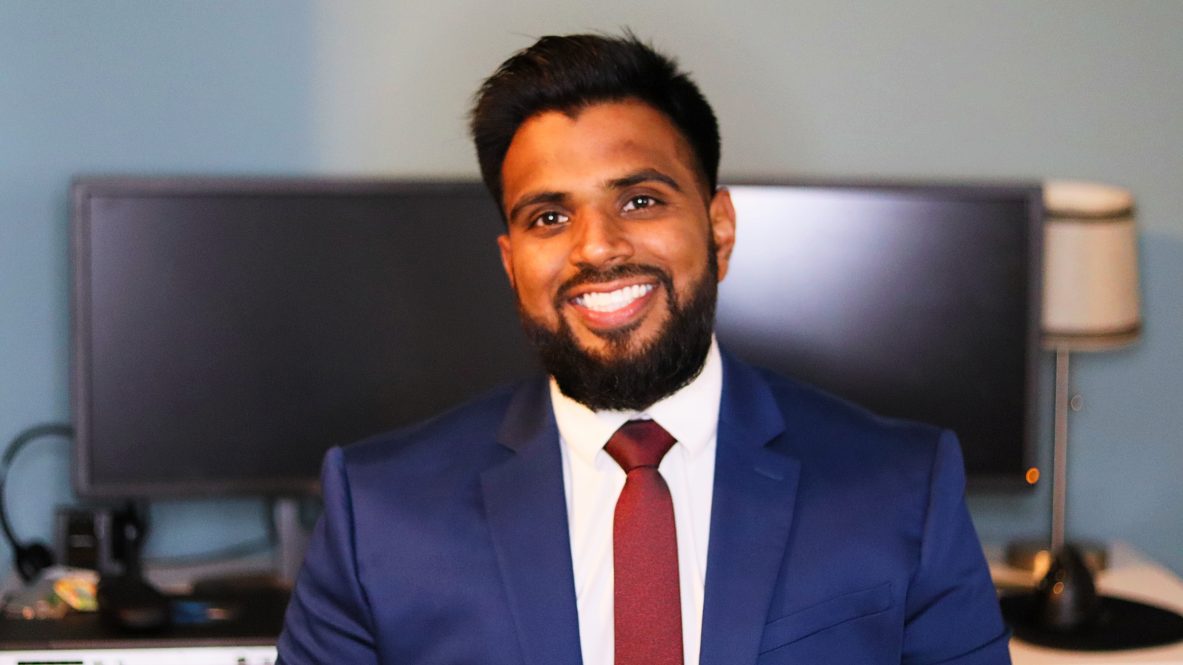When Inaam Khan ‘14 (ENG) went to go look at his academic record near the end of his tenure at the University of Connecticut, he wasn’t too surprised. Several semesters of academic probation had led him to his ultimate fate—the bottom 2% of his graduating class.
Not only was he near the bottom academically, but in his last semester, he ended up failing a class, putting him on a trajectory not to get his diploma on time.
“When I graduated, I walked [in the commencement ceremony] and everything, and then the next day I was actually going to Qatar to visit my sister. When I landed, I got my grades back and I realized I failed one of my classes. I started to freak out because I was offered a full-time job and accepted it. But then I calmed down and realized that they never asked about my degree. So, I knocked out an online class that summer and finished up my degree without any problem.”
Fast forward seven years later, and Khan is doing just fine. He’s a Senior Project Engineer at Pratt & Whitney, has a successful YouTube investment channel called the IKhanic Show, and even launched his own e-commerce sock company several years ago.
Khan, a child of immigrants, was born in Queens, New York, but has spent most of his life in Manchester, where his family moved when he was five. A standout academically in middle school and high school, Khan decided to choose the “safe route” with engineering when plotting his career path.
“Engineering, it wasn’t a passion of mine, it was more of a necessity. As a child of immigrants, I was pushed towards picking a safe, quick major, where I could make some decent money after graduation. I happened to be decent in math, and I couldn’t stand blood, so my other option of medicine was out of the question. My parents always had financial issues growing up, so they wanted me to have a stable career.”
So, in the Fall of 2010, Khan enrolled at the UConn School of Engineering as a Mechanical Engineering major, with confidence in his skills, and a bravado that got him through high school.
But that bravado and confidence in his natural abilities slowly started to eat away at his academic progress.
Used to “coasting” throughout his previous academic years, Khan took the same approach towards college, which caused him a ton of problems.
“It was much easier in high school, I was able to goof off, skip class, but still get A’s and B’s,” Khan says. “So, when I started college I carried over that attitude. Then reality hit when I got to UConn Engineering. You mess around like that and you lose credit in a class, or you’ll get poor grades. And that’s what happened. Boom, my first semester I had a 1.1 GPA and was on academic probation.”
The people who got good grades all their life have a hard time dealing with constant failure later in life — Inaam Khan '14
That woke Khan up, because he was in danger of getting kicked out of UConn.
“At UConn, you can’t be on academic probation and get below 2.0 GPA two semesters in a row, so I was switching between semesters getting above a 2.0, then I’d be below a 2.0 the next semester, and I kept flip-flopping.”
Khan said that while he could have buckled down and studied more, there were events that happened during his four years that had a profound effect on him.
“During my first year, my house caught on fire, and me and my family lived with friends for seven months. My second year, my father had to undergo a quadruple bypass, and he couldn’t work, so I had to take over his automobile repair business while going to school full-time. So, I had several things going on that took my focus away and didn’t help my grades.”
Despite all the challenges Khan had during his undergraduate years, he says he doesn’t look back and regret anything that happened, and that it helped shape him as a person.
He says that old-school thinking connects good grades with success later in life, but for him, that thinking doesn’t take into account the individual.
“For a long time, I thought that the people that do really well in school are not the super successful ones later in life, but that’s a lot of bias, because there are a lot of people who do well in school, and they end up doing well later in life. A lot of people talk about the college drop-outs making it big, but there are also a lot of college valedictorians that have made it big, and we can’t ignore that.
“But I think the big differentiator is that the kids who didn’t do well in school are more okay with taking risks and not worrying about the consequences, which leads to innovation. The people who got good grades all their life have a hard time dealing with constant failure later in life.”
Khan has taken those experiences and the pain of failure and used it as a building block for himself moving forward.
“Once I graduated in the bottom two percent of my class, it gave me a lot of maturity, which led me to get a 3.5 GPA in my MBA, and it made me appreciate school and knowledge more.”
And for a bottom two percent student, who has had a lot of success, Khan says to take your college academic experience with a grain of salt.
“I think the biggest takeaway is that your college experience does not define your life. Even if you fail out of college, it’s not the end of the world. There’s still a lot of opportunities out there for you, but you need the drive to take advantage of them. Don’t let your past dictate your future.”



